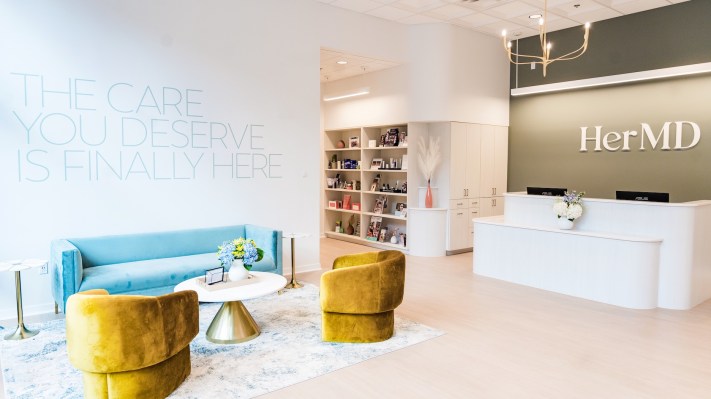HerMD opening new women’s health clinics following $18M extension

Women’s healthcare got another capital infusion today in HerMD, which announced $18 million in additional Series A funding, showing that this area continues to be of interest to investors.
My colleague Dominic-Madori Davis reported earlier this year that women’s health companies raised about $1.16 billion in 2022. Though down from $1.41 billion in 2021, this is still a vast improvement over the $496 million raised in 2020, according to PitchBook data.

Dr. Somi Javaid, founder and chief medical officer of HerMD. Image Credits: HerMD
HerMD is among a group of companies (for example, Herself Health, Tia Health, Vira Health and Adyn) providing care options specifically for women, at all stages of their lives, and attracting venture capital for their approaches.
Founder and chief medical officer Dr. Somi Javaid opened the first HerMD location in 2015 in Cincinnati to help change the notion that less than 20% of OBGYNs are trained in menopause and sexual health care. She later brought on Kathy McAleer as CEO in 2022.
The company offers comprehensive women’s healthcare, either in-person or virtual, and one of its differentiators is that the average appointment is between 20 and 60 minutes. All medical services are insurance- and Medicare-based. In addition, HerMD provides aesthetic services, including facial injectables and body treatments.
To address the lack of training, the company created the HerMD University that centers around proprietary algorithms of care to take providers from classroom to clinic. Providers are able to attend health conferences around menopause and sexual health and participate in monthly meetings.
“The first thing we had to fix was the educational component,” Javaid told TechCrunch. “Some providers have told us that they get more education in the first couple of weeks at HerMD University than they have in their entire career. Then we had to give our providers and patients more time.”
HerMD has around 20 providers between its clinics in Cincinnati, Franklin, Tennessee and Carmel, Indiana and is consistently seeing a waitlist of approximately 500 patients leading up to a clinic opening.
One of the areas that Javaid also focuses on is provider experience, explaining that many providers have become burned out in recent years amid the failings of the existing U.S. healthcare system.
“We’re in this era where we may lose 47% of our workforce by 2025 because of burnout from COVID, because of lack of mission-driven work and because female providers feel like they can’t climb the ladder as well and there’s a pay gap,” Javaid said. “We don’t have any of that at HerMD — it’s equal opportunity. You want to climb the ladder, you climb a ladder. And we give work-life balance, so we have almost zero turnover.”
Meanwhile, the Series A extension was led by existing investor JAZZ with participation from Amboy Street Ventures and B-Flexion. The new investment brings HerMD’s total funding to nearly $30 million.
With the funding, the company will expand its brick-and-mortar locations, including the first in the New York City area and a second Nashville-area clinic. HerMD will also continue developing its virtual services and HerMD University and grow its team — Javaid said there are 100 providers eager to join. The company will also launch mental health services and invest in the latest technologies around sexual health and menopause.
“We will also be introducing e-commerce and physician-curated products,” Javaid said. “Hospital-based systems, and relationships like that, is another thing that we would love to do. We rely on hospitals for imaging, primary care and obstetric and oncology care, but a lot of hospital systems say they struggle because their providers aren’t trained in menopause and sexual health. They need a partner like us, and I see HerMD having over 200 clinics in the future.”




